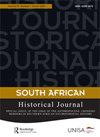安哥拉白人移民反法西斯反殖民运动(1930-1945)
IF 1
3区 历史学
Q1 HISTORY
引用次数: 1
摘要
本文分析了1930年至1945年间,安哥拉白人定居者为反对萨拉查的殖民独裁统治而进行的反法西斯和反殖民的政治努力。它首先分析了定居者政治抗议的起源和特征,特别是考虑到20世纪30年代殖民者与新庄园之间的冲突关系。文章分析了1940/1941年安哥拉一群反法西斯定居者与南非联盟密切相关的分离主义阴谋。此外,这篇文章还谈到了一个名为安哥拉社会主义组织(OSA)的反殖民政治组织的行动,该组织是安哥拉第一个欧洲-非洲民族主义运动。OSA主要由安哥拉出生的年轻白人和混血儿组成,他们要求完全的政治独立,并结束对所有安哥拉人的歧视。然而,OSA遭到葡萄牙当局的严厉镇压,包括天主教会副牧师在内的一些反法西斯定居者被逮捕并驱逐到葡萄牙。尽管如此,尽管独裁政权施加了镇压,但定居者的政治抗议,既是反法西斯的,也是反殖民的,在安哥拉产生了相关影响,促成了1940年代安哥拉民族主义的政治结构。本文章由计算机程序翻译,如有差异,请以英文原文为准。
White Settlers’ Anti-Fascist and Anti-Colonial Movements in Angola (1930–1945)
ABSTRACT This article analyses anti-fascist and anti-colonial political efforts carried out by white settlers in Angola, against Salazar’s colonial dictatorship, between 1930 and 1945. It begins with an analysis of the origins and characteristics of the settlers’ political protest, considering in particular the conflicted relationships between the colonists and the Estado Novo in the 1930s. The article then analyses the secessionist conspiracy in 1940/1941, which was promoted by a group of anti-fascist settlers in Angola, in close connection with the Union of South Africa. Additionally, the article deals with the action of an anti-colonial political organisation named Organização Socialista de Angola (OSA), which was the first Euro-African nationalist movement in Angola. OSA was mostly formed by young Angolan-born whites and mestiços, who demanded full political independence as well as the end of discrimination against all Angolans. However, OSA was severely repressed by the Portuguese authorities, and a number of anti-fascist settlers, including the Vicar General of the Catholic Church, were arrested and deported to Portugal. Nonetheless, despite the repression exerted by the dictatorship, the settlers’ political protest, which was both anti-fascist and anti-colonial, had relevant repercussions in Angola, having contributed to the political structuring of Angolan nationalism in the 1940s.
求助全文
通过发布文献求助,成功后即可免费获取论文全文。
去求助
来源期刊

South African Historical Journal
Multiple-
CiteScore
0.70
自引率
0.00%
发文量
37
期刊介绍:
Over the past 40 years, the South African Historical Journal has become renowned and internationally regarded as a premier history journal published in South Africa, promoting significant historical scholarship on the country as well as the southern African region. The journal, which is linked to the Southern African Historical Society, has provided a high-quality medium for original thinking about South African history and has thus shaped - and continues to contribute towards defining - the historiography of the region.
 求助内容:
求助内容: 应助结果提醒方式:
应助结果提醒方式:


